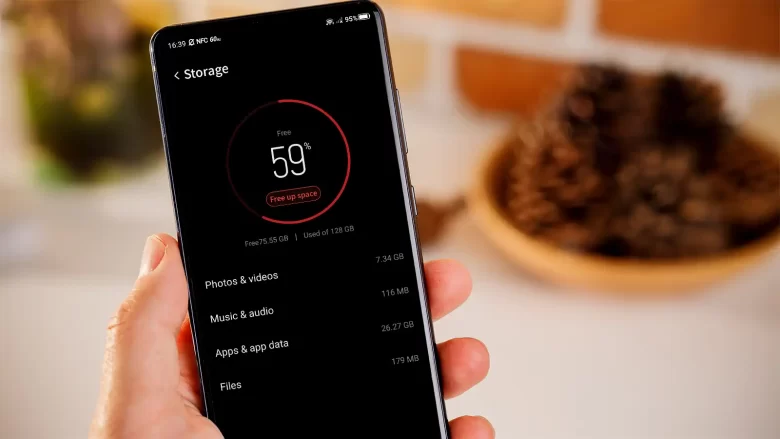With smartphones becoming so important to our daily lives, people need more space to store their stuff. Everything on your phone, from photos and videos to apps and files, takes up space that you could use for other purposes. Over time, having too many files can affect how well your computer performs, causing pages to load slowly and making it difficult to install new applications or updates. Freeing up storage space isn’t just about making space; it’s also about keeping your device running smoothly. By managing your phone’s storage properly, you can prevent your phone from slowing down, making it more enjoyable to use.
1. Delete Unnecessary Files and Media
Deleting unnecessary files and media is one of the easiest ways to free up more space on your phone. Photos, videos, and downloaded files can take up a lot of space on your device if you don’t delete or view them regularly. Go through your library regularly and delete photos and videos that are duplicates, blurry, or don’t fit what you want. Your Downloads folder also contains a lot of files that you may no longer need. Clearing these areas can free up a lot of space on your phone, making it faster and easier to use.
2. Use Cloud Storage Services
iCloud, Google Drive, Dropbox, and OneDrive are all cloud storage services that make it easy to free up space on your phone while still keeping important files at your fingertips. You can access your photos, videos, and documents at any time by keeping them in the cloud instead of on your device. Many cloud services offer free storage plans that let you add more space as needed. Another benefit of connecting your phone to the cloud is that your files are automatically backed up, so you won’t lose them if something goes wrong with your phone.
3. Clear Application Cache Data
Caches are temporary data that applications store to make them perform better and load content faster. But over time, this cached data can build up and take up valuable storage space. Clearing an app’s cache not only frees up space but can also fix minor performance issues. You can clear your cache in the settings menu of most phones. This is usually found under Storage or Application Manager. Clearing your cache regularly can help you manage storage and keep your apps running smoothly without taking up extra space.
4. Delete Unused Apps
It’s easy to end up with apps that you no longer need or have outgrown over time. These apps take up space on your phone and can use system resources in the background, slowing them down. Check your installed apps regularly and delete the ones you no longer use. Try to avoid large apps like games, photo editing tools, and other large apps. Many phones have a feature that lets you rate apps that you don’t use often. This makes it easier to select what to delete. Your phone will run better and take up less space if you only keep the apps that you use often.
5. Managing Large Files and Videos
Large files, especially videos, can quickly eat up a lot of storage space on your phone. Finding and dealing with these large files can help you free up a lot of space. First, go through your video library and delete any old or unwanted clips. You can also move large files to your computer or external hard drive for safekeeping and to free up space on your phone. If you record a lot of video, you may want to lower the quality settings to make the file size smaller. Keeping large files safe ensures that you always have room for new content.
6. Use External Storage Options
If your phone has expandable storage, adding a microSD card externally is a great way to get more space. MicroSD cards are inexpensive and can be used to store photos, videos, music, and even some apps, depending on your phone. Moving files to an external card not only saves space on your computer’s hard drive but also gives you a separate place to store your most important files. If your phone doesn’t support microSD cards, you can use an external USB drive or a wireless storage solution that connects to your phone. These options give you more space without filling up your phone’s memory.
7. Optimizing Your Phone’s Storage Settings
Many smartphones come with storage management apps that help you make the most of your storage space. These tools make it easy to find large files, duplicate content, and rarely-used apps so you can take action. Some phones also have smart storage features that let you delete backed-up photos or files after a certain period. This prevents your phone from filling up its memory. Learning how to use these management tools and getting used to your phone’s storage settings can help you keep your phone organized and running smoothly.
8. Deleting Old Messages and Media from Chats
Some messaging apps, like WhatsApp, Telegram, and iMessage, can store large amounts of media files, such as photos, videos, voice notes, and documents. This collection of files can quickly take up a lot of space. By deleting old messages, group chats, and media files from these apps, you can free up more space on your phone. Many messaging apps have built-in storage management tools that let you view and delete large files or conversations. Chat media should be managed regularly so that your messaging app doesn’t take up too much space without your knowledge.
9. Using Lite Versions of Apps
Many popular applications have “lite” versions, which are smaller and use fewer resources than their full versions. Apps like Google Go, Facebook Lite, and Messenger Lite perform basic functions without all the extra stuff that the main app does. If your phone doesn’t have enough storage space, switching to these “lite” versions can save you space. Lite versions of apps typically use less data and battery, and take up less space. This provides a better experience without sacrificing important functionality.
10. Regularly Review and Managing Your Downloads
If you download a large number of documents, PDFs, or other media files, the number of downloads can quickly add up. You can manage your storage space by regularly going through your downloads folder and deleting unnecessary content. Doing this prevents old files from piling up and taking up space that could be used for new apps or content. Make it a habit to check your downloads weekly or monthly and delete anything you no longer need or want.
Conclusion
Deleting unnecessary files on your phone is a simple and effective way to make your phone run better and extend its life. You can keep your device running smoothly by regularly deleting unnecessary files, managing large media files, using cloud storage, and getting the most out of your phone settings. Keeping your phone clean means you can always add new apps, updates, and media without worrying about bugs or slowdowns. With a few simple steps and regular maintenance, you can keep your smartphone clean, responsive, and ready for whatever you need.




